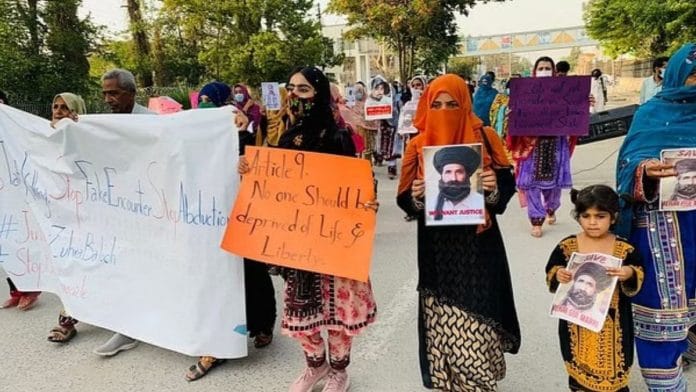New Delhi: Amid the Israel-Iran conflict, some Pakistani liberals have waged a war of words over a Left-wing activist who conflated the Baloch movement with an Iranian militant group. The anti-Shia separatist group Jaish al-Adl called on Baloch militants in Pakistan to join their fight against the Iranian regime.
Jaish-al-Adl, a Sunni militant separatist group with a stated aim for independence for the Iranian province of Sistan and Pakistan’s Balochistan province, gave a call for an armed fight against the Iranian regime of Ayatollah Ali Khamenei on Monday. They called on the Baloch population from Pakistan to join in their fight, an apparent reference to the militant group Baloch Liberation Army (BLA) present in Pakistan’s restive region of Balochistan.
“We call on all the people, especially the people of Balochistan, as well as the armed forces, to join the ranks of the resistance so that the path to freedom and dignity for all of us is paved,” the group said in public statement on Twitter.
Public policy analyst and left-wing activist Ammar Rashid claimed the BLA had supported India during past conflicts like Operation Sindoor, and suggested a similar foreign connection to Jaish al-Adl.
“Much like BLA openly oordinated attacks w/ India during its war on Pakistan, Baloch rebels in Iran are coordinating their ‘uprising’ w/ the Israeli regime change war,” he tweeted, “Yet bring up Mossad involvement in Baloch nationalist movements & CIA libs will call you a ‘Punjabi chauvinist’.”
Rashid’s comments were quickly criticised by other Pakistani liberals and Baloch activists, who said he was unfairly linking Baloch movements to foreign agendas and ignoring the real grievances faced by the Baloch people.
“Ah yes, thousands of tortured, disappeared and mutilated Baloch just so Mossad can play 4D chess,” Dawn reporter Alifya Sohail responded to Rashid’s post, adding that he “intentionally conflated BLA, Baloch rebels and Baloch nationalist movements in a single tweet as imperialist puppets.”
“You aren’t exposing the empire, Ammar, you’re laundering it. It’s the same playbook used to smear PTM as Afghan proxies, Kashmiris as Pakistani agents, or Palestinians as Iranian puppets,” she added.
Others too opposed Rashid’s view. Rafiullah Kakar, a columnist specialising in insurgent movements, called Rashid’s framing “a poor take, rooted in an even weaker understanding of armed groups and movements active in Baloch regions on both sides.”
But why was the Baloch movement in Pakistan, which is not a religion-based movement, linked to a Sunni separatist group operating out of the Iranian border?
Also read: A reformed Iran is a valuable friend to India
Jaish al-Adl’s Balochistan connect
Jaish ul-Adl, or the “Army of Justice”, is a Sunni militant separatist group active in southeastern Iran, primarily in the Sistan and Balochistan province. The group advocates for the independence of both Iran’s Sistan region and Pakistan’s Balochistan province. It has carried out numerous attacks on Iranian security forces. It remains a key point of friction between Tehran and Islamabad, with Iranian officials frequently accusing Pakistan of providing sanctuary to the group.
The Iranian militant group is made up of ethnic Baloch fighters who live on both sides of the Iran-Pakistan border. Pakistan claims the group doesn’t have an organised presence in its territory but admits that some militants may be hiding in remote areas of Balochistan — the country’s largest and most troubled province, due to a long-running separatist insurgency. Local people there say they face discrimination and are denied a fair share of the region’s resources.
Iran and nuclear-armed Pakistan have long viewed each other with suspicion, especially over cross-border militant attacks.
The most serious escalation came in January 2024, when Iran launched missile strikes into Pakistan’s Balochistan province, targeting what it claimed were Jaish al-Adl camps. In response, Pakistan struck alleged Baloch Liberation Army and Baloch Liberation Front hideouts inside Iran. The exchange was unprecedented in its intensity, marking a significant deterioration in bilateral trust.
Key difference between 2 groups
The Balochistan Liberation Army is driven by Baloch nationalists and separatist ideology, firmly rejecting Pakistani control over Balochistan and seeking to create an independent state.
This was pointed out by defence analyst Ayesha Siddiqa, who called the conflation of the Iranian and Baloch groups ‘an illiterate take’.
Siddiqa, however, pointed out that Iranian Baloch groups have generally not called for full independence from Iran. Instead, they have demanded greater autonomy and improved treatment from the Iranian government. Their struggle is often shaped more by sectarian tensions—specifically between the Sunni Deobandi Baloch and the Shia-led regime—than by ethnic separatism.
“Baloch insurgency did not begin in reaction to the India-Pakistan conflict. It is the 5th rebellion in BLN. And BLA’s operational capability did not increase overnight. It occurred months before the Pakistan-India conflict escalated. Last August’s coordinated attacks are an example,” Kiyya Baloch, a journalist covering the insurgency, gave historical context.
Sajid Baloch, another activist, highlighted the contradictions between Rashid’s suggestion vis-à-vis the State narratives: “Pakistan’s military minister says every day that Baloch freedom fighters are helped by Iran, and on the other hand, they say they are Israeli agents. The accusations have been going on since the 70s. I wish someone would actually help.”






